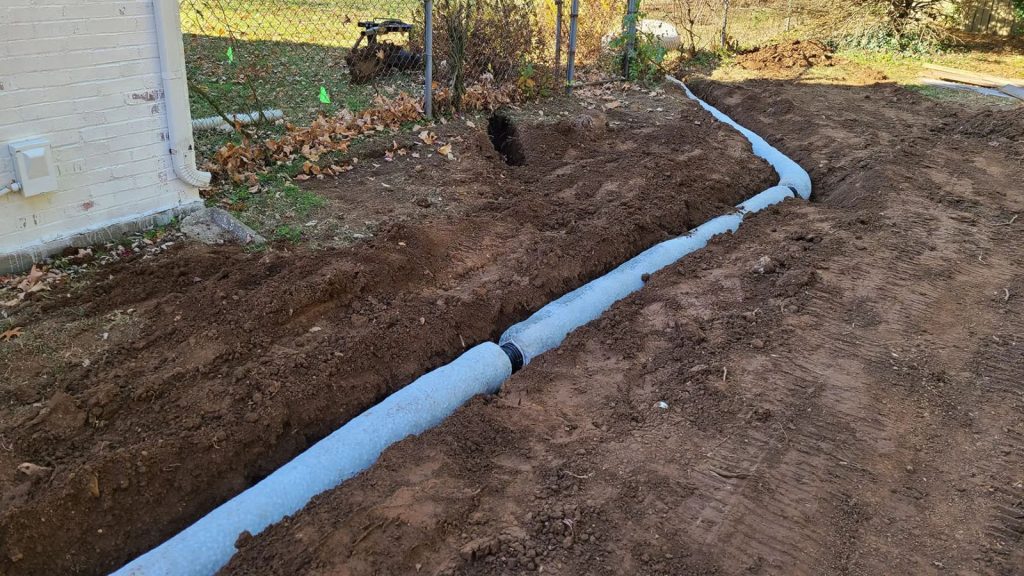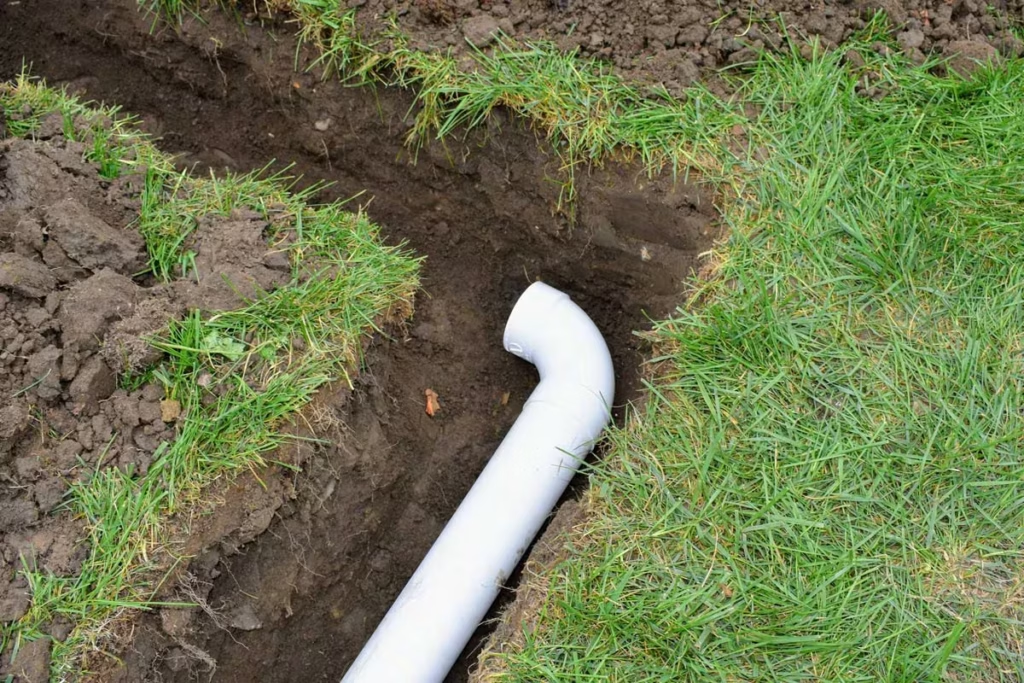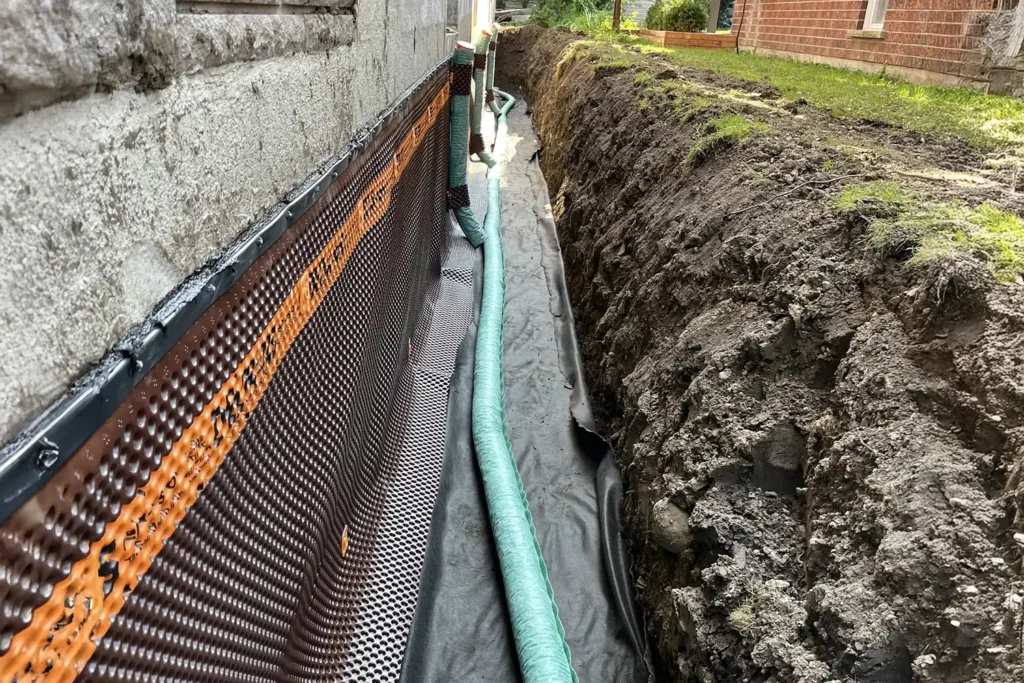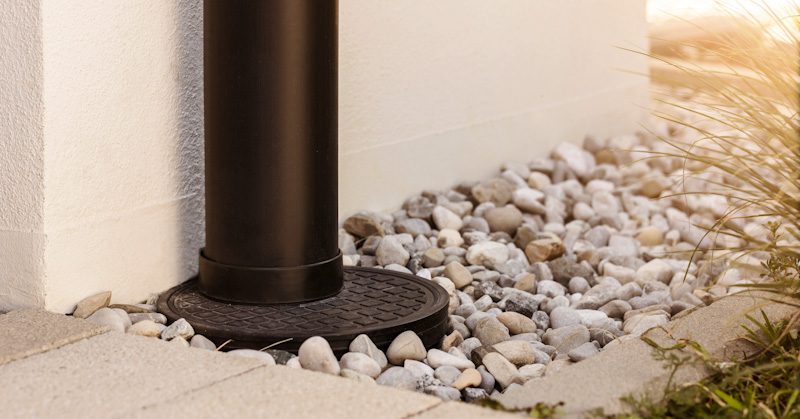How Much Does a French Drain Cost – Don’t Overpay Again
A French drain system is a great solution for managing water drainage and preventing damage around your property.
Whether you’re tackling soggy yards or basement leaks, it can keep your home dry. Before installing, it’s important to understand the costs involved.
This guide breaks down the factors that affect the price and what to expect during installation.
How much does a French drain cost?
A French drain typically costs between $1,000 and $4,000 depending on the size, material, and labour. Larger, more complex installations will cost more, while simple DIY options can be cheaper.
Key Takeaways
- The average cost of a French drain installation typically ranges from $1,000 to $4,000, depending on various factors.
- The size, complexity of the installation, and type of materials used can all influence the cost.
- Hiring a professional contractor ensures that the job is done correctly, but you can also opt for a DIY approach if you have the skills and tools.
What Is a French Drain and How Does It Work?

Before we dive into the costs, it’s essential to understand what a French drain is and how it works.
A French drain is a trench filled with gravel or rock that contains a perforated pipe. The pipe helps redirect water away from problem areas, such as your basement or yard.
The water is absorbed by the surrounding gravel or rock, then flows through the pipe and away from the area to a designated drainage point.
French drains are commonly used to manage excess water around foundations, gardens, and other areas prone to flooding.
They can be installed either below or above the ground, depending on the specific needs of your property.
Factors That Affect the Cost of Installing a French Drain

The cost of a French drain installation varies widely based on several factors.
Understanding these factors will help you estimate how much you’ll need to spend and what to expect during the installation process.
1. Size of the Drain
The size of the French drain is one of the most significant factors affecting the cost. A larger drain will require more materials, labour, and time to install.
The typical cost per linear foot for a French drain can range from $30 to $70, depending on the size and complexity.
Example: A small French drain of 10 to 20 feet may cost between $500 and $1,000, while a larger drain covering 50 to 100 feet could cost between $2,000 and $4,000 or more.
2. Depth of the Drain
The depth of the trench also affects the overall cost. Installing a deeper French drain requires more excavation, which can increase both material and labour costs.
In some cases, deeper drains may also require additional support, such as retaining walls or specialized drainage solutions.
Example: Shallow drains (1 to 2 feet deep) may cost less to install, while deeper drains (3 to 5 feet deep) could increase costs significantly due to the extra digging and materials needed.
3. Material Costs
The materials used in the construction of the French drain also influence the price.
Basic materials include gravel, perforated pipe, and fabric filter cloth, but you can choose from a range of higher-end materials depending on your preferences and the requirements of your property.
Gravel: Standard gravel is the most affordable option for filling the trench. The French Drain system costs between $10 and $30 per cubic yard.
Perforated Pipe: Perforated pipe typically costs between $1 and $3 per foot, depending on the diameter and quality.
Landscape Fabric: Landscape fabric is used to prevent dirt from clogging the drain. It typically costs $0.50 to $1 per square foot.
4. Labour Costs
Labour costs can vary depending on where you live and the complexity of the installation. On average, you can expect to pay between $40 and $100 per hour for a professional contractor.
The total labour costs will depend on the size of the drain and the time required to complete the job.
Example: For a typical French drain installation, labour costs could range from $500 to $2,000, depending on the complexity and time needed.
5. Type of Drain
There are several types of French drains, and each can have a different price tag.
For example, a traditional French drain installed in a trench will cost less than a more complex system, such as a dry well or surface drain system.
The type of drain you choose will impact both the materials required and the complexity of the installation.
Example: A basic trench-style French drain is the most affordable option, while a French drain with additional features, such as a dry well or surface drainage system, can increase the cost.
Additional Costs to Consider
While the basic cost of a French drain installation includes materials and labour, there are other potential expenses that may arise during the process.
Here are a few additional costs to keep in mind:
1. Permitting and Inspections
Depending on where you live, you may need a permit to install a French drain.
Local regulations may require inspections before and after installation to ensure the system meets building codes. Permit fees typically range from $50 to $300, depending on your location.
2. Landscaping Costs
After installing a French drain, you may need to restore the landscaping around the drain. This could involve replanting grass, laying sod, or filling in the trench with topsoil.
Landscaping costs can range from $100 to $500 or more, depending on the extent of the work needed.
3. Drainage System Additions
In some cases, a French drain installation may require additional drainage solutions, such as a sump pump, dry well, or surface drain.
These additions can add several hundred to a few thousand dollars to the total cost, depending on the complexity and the materials used.
DIY vs. Professional French Drain Installation

One way to save on the cost of a French drain installation is by taking a DIY approach.
While installing a French drain yourself is possible, it requires careful planning, time, and effort. Here are the pros and cons of doing it yourself versus hiring a professional.
1. DIY Installation
Pros: Significant cost savings, control over the project, and a sense of accomplishment.
Cons: Requires proper knowledge and tools, time-consuming, and potential for mistakes that could lead to more expensive repairs later.
2. Professional Installation
Pros: Professional contractors have the experience and tools to complete the job quickly and efficiently, ensuring a high-quality installation.
Cons: Higher upfront cost for labour and materials.
If you decide to hire a professional, always get multiple quotes and check reviews to ensure you’re choosing a reputable contractor.
How to Estimate the Cost of Your French Drain

To get a better idea of how much it will cost to install a French drain at your home, follow these steps:
Installing a French drain is an effective way to manage water runoff and prevent flooding in areas where water tends to accumulate.
Whether you’re experiencing water pooling in your basement, yard, or around the foundation of your home, a French drain can help divert excess water and improve the overall drainage system of your property.
However, before you start digging, it’s important to get a clear understanding of how much it will cost to install a French drain. Here are the steps to help you estimate the cost of your French drain project.
1. Measure the Area
The first step in estimating the cost of your French drain is to measure the area where the drain will be installed.
The size of the area plays a critical role in determining how much material you will need, including the drain pipe, gravel, and other components.
Start by measuring the length and width of the area where water is accumulating or where you plan to direct the water. This gives you the initial idea of how much material will be required.
Length of the French Drain: Measure the total length of the drain you need. French drains are typically installed in a trench that runs along the area that requires drainage.
Measure the linear feet of the trench where the French drain will be placed, making sure to account for any curves or turns the drain will need to take.
Depth and Width of the Trench: The depth and width of the trench are essential in determining the total amount of gravel and pipe you’ll need.
Standard French drains are usually between 12 to 18 inches wide and 18 to 24 inches deep, but this can vary depending on the amount of water you need to divert.
The deeper and wider the trench, the more materials will be required, and the higher the cost.
By calculating the length, width, and depth of the area, you’ll be able to estimate the volume of material needed for the installation.
You can also plan how much space will need to be excavated, which impacts both material costs and labor costs.
2. Check Local Costs
Once you have an idea of the materials required, it’s time to check the costs in your area.
Prices for French drain materials and labor can vary depending on your region, the complexity of the installation, and the availability of contractors.
Here’s how you can get a better understanding of what to expect:
Materials Costs: Common materials needed for a French drain include perforated pipe, gravel, filter fabric, and possibly a catch basin.
The cost of these materials can vary based on their quality and type. For example, high-quality perforated pipes or gravel with larger stones may cost more than standard versions.
Research the prices for materials at local home improvement stores or online retailers to get an idea of the cost.
Labor Costs: Labor is one of the most significant factors in the total cost of a French drain installation.
The price of labor will depend on the complexity of the job, the size of the drain, and local market rates for contractors.
If your drain requires more complicated excavation (such as digging through tough soil or navigating around existing structures), the labor costs will likely be higher.
On average, contractors may charge anywhere from $50 to $100 per hour, with installation typically taking 2 to 3 days for an average-sized residential project.
Permitting Fees: Depending on your location and the scope of the project, you may need a permit to install a French drain, especially if it involves digging near property lines or the foundation of the house.
Check with your local municipality to see if a permit is required, and factor this cost into your budget.
Additional Costs: If the area where the French drain is to be installed has poor soil conditions, requires grading or rerouting of other systems (like downspouts or existing drainage), or if your property is heavily landscaped, you may incur additional costs for specialized equipment or extra labor.
Always factor in these potential added costs when estimating the total price.
3. Consult with Professionals
While you can make a rough estimate of costs based on measurements and local pricing, it’s always a good idea to consult with professionals to get a more accurate estimate for your French drain installation.
Local contractors who specialize in drainage systems can assess your property and provide a detailed cost estimate based on the specific conditions of your home.
They’ll also be able to help you with the following:
Frequently Asked Questions
1. How long does it take to install a French drain?
The installation time for a French drain typically ranges from one to three days, depending on the size and complexity of the system.
2. Can I install a French drain myself?
Yes, installing a French drain can be done as a DIY project, but it requires the right tools, knowledge, and time. If you’re unsure, hiring a professional is recommended.
3. Will a French drain solve all my drainage problems?
A French drain is an effective solution for managing excess water, but it may not resolve all drainage issues, especially if there are underlying problems like improper grading or a high water table.
Conclusion
The cost of installing a French drain can vary greatly depending on factors such as the size of the area, the type of materials used, and whether you choose to hire a professional or tackle the project yourself.
On average, you can expect to pay between $1,000 and $4,000, but additional factors like landscaping, permits, and additional drainage solutions may add to the cost.
If you’re dealing with drainage issues, a French drain is a worthwhile investment that can save you money on water damage and improve the overall functionality of your property.
Consider consulting with a professional to get an accurate estimate and ensure that the job is done properly.
